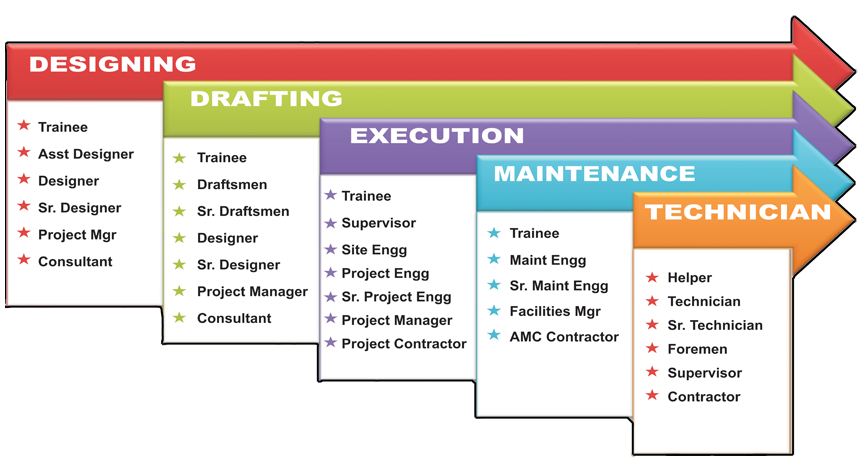HVAC Training Institute
HVAC Design and Drafting
- 45 Days Training
- Project Work With Next Trends
- Placement Assistance
HVAC Design & Drafting course helps you core domains like Design and Drafting systems
The Course enables the entry level and working engineers to understand the basics, different systems used in Air Conditioning for Domestic and commercial purposes.
To achieve the optimal design, one should needs good analytical skills and up-to-date technical knowledge of various system designs. This training is useful to design HVAC Systems. This training is an opportunity to apply the academics and develop an understanding of how to develop solution-driven concepts and translate them into a complete set of plans and prototypes.
HVAC Required in Commercial Buildings, Airports, Shopping malls, Petrochemical complex, refineries, pharmaceutical industry, Aerospace industry, Hospitals etc..,
HVAC Course Content
a. Fundamentals
b. Modes of Heat Transfer
c. Sensible Heat and Latent Heat
d. Codes and Standards
2.Basic Components of Air-Conditioning and Refrigeration machines
a. Basic Refrigeration System or Vapor Compression Cycle
b. Pressure – Enthalpy Chart
c. Function & Types of Compressor
d. Function & Types of Condenser
e. Function & Types of Expansion Valve
f. Function & Types of Evaporator
g. Accessories used in the System
h. Refrigerant and Brines
3. Classification of Air-Conditioning System
a. Window A/C
i.Working of Window A/C with Line Diagrams
b. Split A/C
i.Types of Split A/C
ii.Working of Split A/C with Line Diagrams
c. Ductable Split A/C
i.Working of Ductable Split A/C with Line Diagrams
d. Variable Refrigerant Volume (VRV)/Variable Refrigerant Flow (VRF)
e. Ductable Package A/C
i.Working of Ductable Package A/C with Line Diagrams
ii.Package Roof Top Units
f. Central Plant Chill Water System
4. Categories of Air Conditioning
a. All air system
b. All water system
c. Air - water system
d. Direct Refrigerant system
5. Study of Psychometric Charts
a. Dry Bulb Temperature
b. Wet Bulb Temperature
c. Dew Point Temperature
d. Relative Humidity
e. Humidity Ratio
f. Processes
i.Heating
ii.Cooling
iii.Cooling and Dehumidification
iv.Heating and Humidification
v.Finding Values Using the Chart
6. Load Calculation.
a. Survey of Building
b. Cooling Load Steps
c. Finding Temperature difference(?T) (Wall, Glass, Roof , Partition)
d. Finding ‘U’ Factor (Wall, Glass, Roof, Partition)
e. Finding Ventilation requirement for IAQ
f. Load Calculations (Manually using E-20 form)
g. ESHF, ADP & Air Flow Rate(CFM) Calculation
7. Air Distribution System
a. Duct-Definition & Terminology
b. Duct Design consideration
c. Duct sizing methods
d. Duct sizing as per Aspect Ratio
e. Finding Duct size using Ductlator
f. Selection of Diffusers and Grilles
g. Gauge selection for Sheet Metal
h. BOQ Preparation for Duct System.
i. Legends and Symbols used in the HVAC Industry
j. Duct Materials and Insulation materials used in HVAC Industry
k. Concept of CAV & VAV
8. Static Pressure Calculation
a. Selection of Motor HP
b. Selection Fan/Blower RPM
c. Selection Air Handling Units.
9. Hydronic System
a. Classification of Water Piping
b. Pipe sizing for chill water system
c. Fittings used in the HVAC Piping System
d. Valves used in the HVAC Piping System
e. Function of Valves
f. Pump Head Calculation
g. Selection of Pumps
10. VRF/VRV System
a. Selection of VRF/VRV Equipments
b. Indoor unit grouping
c. Copper Pipe Sizing
d. Refnet Pipe Selection
11. Air Conditioning Concepts
a. District Cooling System
b. Green Building
c. Clean Rooms
12. Ventilation systems
a. Kitchen ventilation system
b. Car parking ventilation system
c. Toilet Exhaust Ventilation System
13. Fire Protection (Awareness)
14. HVAC software’s
a. XL sheet for Load Calculation
b. Carrier Block Load for Load Calculation (HAP)
c. Duct sizer for Duct sizing
d. TroxCADBase for Diffuser & Grilles
e. Pipe sizer for Pipe sizing
f. Psychrometric Software
15. Improving Employability Skills
a. Resume Writing Skills
b. Interview Skills Empowering
c. Empowering of Interpersonal Relationships
d. Stress Management
e. Positive Attitude Development
f. Self-Motivation
g. Sentence formation
h. Presentation skills
i. Roles & Responsibilities of Design Engineers
Project Work:
• Two live projects have to be completed before getting the Certificate and Placement Assistance.
HVAC Course Duration : 45 days
Eligibility
Any Graduation, Diploma

India HVAC market is expected to cross INR 45,000 Cr by 2022. Growing Economy and infrastructure-based developments and increasing tourism are expected to positively influence India HVAC market over the next five years. The expected 100 Smart Cities are also to be considered.
The increase in the financial status of majority of the population is also one of the reasons for the growth of the HVAC Industry
As per the surveys it is estimated that 2/3 of our Country is yet to be built for the needs of 2030.

